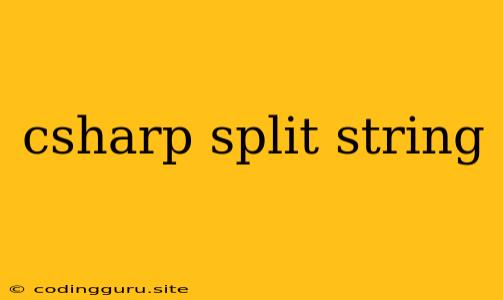Splitting Strings in C#
In the world of programming, manipulating strings is a fundamental skill. C# provides a powerful and versatile set of tools to handle strings, and one of the most common operations is splitting a string into smaller parts.
Why split strings?
Imagine you have a string representing a comma-separated list of items, like a shopping list:
string shoppingList = "Milk,Eggs,Bread,Cheese";
To access each item individually, you need to split the string into separate parts, each representing an item on the list. This is where the Split() method in C# comes to the rescue.
Understanding the Split() Method
The Split() method is your go-to tool for breaking down a string into smaller parts. Here's how it works:
-
Define a delimiter: You need to tell the
Split()method how to identify where the string should be divided. This is done by specifying a delimiter – a character or a string of characters that marks the boundaries between the parts you want to extract. -
Splitting the string: The
Split()method uses the delimiter to locate these boundaries and breaks the original string into an array of substrings, where each substring represents a portion of the original string between two delimiters.
Using Split() with Different Delimiters
Let's explore some common scenarios where you might use the Split() method:
1. Splitting by a Single Character:
-
Example: You want to split a string representing a date, "12/25/2023", into its individual components: day, month, and year.
-
Solution: Use the
Split('/')method to split the string using the forward slash as a delimiter.
string dateString = "12/25/2023";
string[] dateParts = dateString.Split('/');
// Access individual date components:
int day = int.Parse(dateParts[0]);
int month = int.Parse(dateParts[1]);
int year = int.Parse(dateParts[2]);
2. Splitting by Multiple Characters:
-
Example: You want to split a sentence into individual words, separating them by spaces.
-
Solution: Use the
Split(' ', StringSplitOptions.RemoveEmptyEntries)method.StringSplitOptions.RemoveEmptyEntriesensures that you don't get empty strings in your array if there are consecutive spaces in the original string.
string sentence = "This is a sentence with multiple words.";
string[] words = sentence.Split(' ', StringSplitOptions.RemoveEmptyEntries);
// Access individual words:
foreach (string word in words)
{
Console.WriteLine(word);
}
3. Splitting by a Specific String:
-
Example: You want to split a string containing email addresses separated by semicolons (
;). -
Solution: Use the
Split(';')method.
string emailAddresses = "[email protected];[email protected];[email protected]";
string[] emails = emailAddresses.Split(';');
// Access individual email addresses:
foreach (string email in emails)
{
Console.WriteLine(email);
}
4. Splitting by Regular Expressions:
-
Example: You have a string containing HTML tags and want to extract only the text content.
-
Solution: Use the
Split()method with a regular expression that matches the HTML tags:
string htmlText = "This is some HTML text.
";
string[] textParts = htmlText.Split(new string[] { "", "
" }, StringSplitOptions.RemoveEmptyEntries);
// Access individual text parts:
foreach (string textPart in textParts)
{
Console.WriteLine(textPart);
}
Important Considerations
-
Empty Delimiters: Be mindful of empty delimiters. If you split a string by a space but have consecutive spaces, the
Split()method will return empty strings. UseStringSplitOptions.RemoveEmptyEntriesto avoid these. -
Character Encoding: When working with text that might contain characters from different languages, ensure you are using the correct character encoding.
-
Regular Expressions: While powerful, regular expressions can become complex quickly. Use them judiciously and carefully test your code to avoid unexpected behavior.
Conclusion
The Split() method in C# is a crucial tool for string manipulation. It allows you to break down strings into smaller parts based on specific delimiters, enabling you to process and analyze individual components. By understanding its functionality and various usage scenarios, you can harness its power to efficiently handle and manipulate strings in your C# applications.
